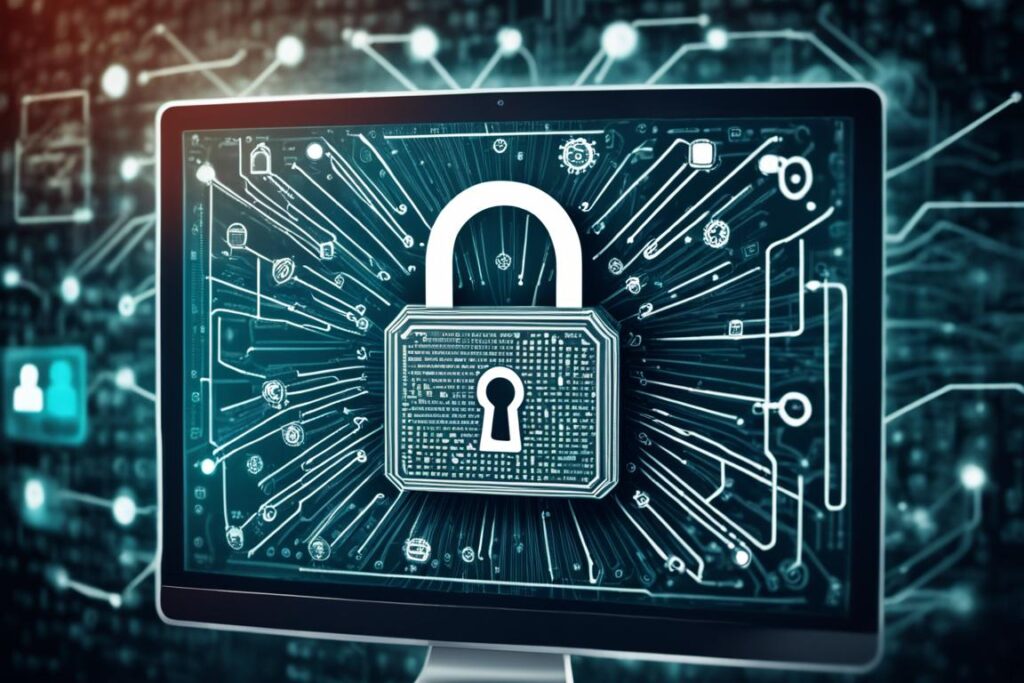Securing Computers from cyber threats is vital today. Hackers and malware are more common than ever. It’s crucial to take steps to keep your computer and personal data safe.
We will look at key strategies to improve your computer’s security. By doing this, you can protect your online life better.
Key Takeaways:
- Enable the built-in firewall or consider purchasing a hardware firewall to create an extra layer of defense.
- Keep your software, including the operating system and applications, up to date by enabling automatic updates.
- Use antivirus software to detect and remove malware, and regularly update it for the latest protection.
- Create strong and unique passwords for all your accounts, and consider using a trusted password manager.
- Be cautious when opening attachments or clicking on links in messages, and avoid visiting suspicious websites.
Tips for Protecting Your Personal Information Online
Keeping your personal info safe online is vital today. A few easy steps can help you keep your privacy. This also reduces the risk of identity theft and keeps you safe on the internet. Here are some tips to guard your personal data:
Control the amount of information you provide online
Be picky about what you share online. Don’t give out details like your home address or phone unless you have to. Keep social media profiles light on personal info. And steer clear of sharing sensitive stuff publicly.
Be aware of scams and phishing emails
Watch out for phishing emails that try to get your personal details or logins. Be careful of emails from unknown senders. Don’t tap on strange links or open files. Always make sure emails asking for info are really from who they say they are.
Use strong passwords and enable two-factor authentication
It’s important to have strong, unique passwords for every online account. Avoid obvious choices or personal details as passwords. A password manager can help you keep track. For extra security, turn on two-factor authentication where you can.
Manage your social media privacy settings
Take the time to check and set your social media privacy rules. Choose who gets to see your info and posts. Also, keep personal posts to a close circle of friends. Always keep an eye on and update these settings as you see fit.
Keep your software up to date
Always update your operating system, apps, and web browser. These updates often fix key security issues. Enable auto-updates to keep your protections current.
Be cautious of websites and online shopping
Always be alert when surfing or buying online. Look for the “https” and a lock in the address to show a site is secure. Be suspicious of sites that ask for too much personal data or seem not to be secure.

By following this advice and keeping an eye out, you can better protect your personal info online. This also helps you avoid cyber threats and identity theft.
Essential Security Measures for Business Networks
In today’s world, businesses deal with many cyber threats. It’s vital for them to have a strong approach to cybersecurity. By using proactive steps and reliable security software, a business can lower its cybercrime risk.
Firewalls: Your First Line of Defense
Firewalls are key in stopping unauthorized access. They can be in the operating system or as separate hardware. They watch the network’s traffic, letting through only safe data.
Get Firewalls from firewalls.com
Antivirus Software and Antispyware: Detect and Remove Threats
Having updated antivirus and antispyware is critical. They find and delete harmful software. Keeping them up-to-date is key to staying ahead of cybercriminals.
Buy antivirus and antispyware from Nortan
Strong Passwords and Two-Factor Authentication
Complex passwords and 2FA bolster network security. Strong passwords mix different characters to stop attacks. 2FA ensures only authorized users can access the system.
Regular Software Updates: Patch Vulnerabilities
Don’t forget to update all software with the latest security patches. This keeps your network safe. Hackers look for weaknesses, but updates make them harder to find.
Employee Training: The Human Element
Training staff on cybersecurity is as important as tech defenses. It helps them spot threats. Regular training and tests keep their security skills sharp.
Regular Data Backups: Preventing Loss
Back up your data often to prevent loss from attacks. A good backup system saves data in different places. Always check that your backup system works well.
Implement Network Security Measures
Use extra security measures like secure routers and encryption. They add more protection. Encrypted data is safe, even if someone tries to view it without permission.

These security steps are crucial for any business. They help keep networks and data safe. Remember, staying safe from cyber threats is an ongoing effort. Always learn about new threats and how to protect against them.
Conclusion
Protecting your computer from new cyber threats is vital. By following the advice in this guide, like using firewalls and antivirus, you lower the chance of cyber attacks.
Keep an eye out and update your software regularly. This keeps your system secure and strong. Make sure you and your team know the latest security steps too.
Keeping your computer safe is a constant task. Be proactive and use the right safeguards. This way, you keep your information safe in today’s digital era.



